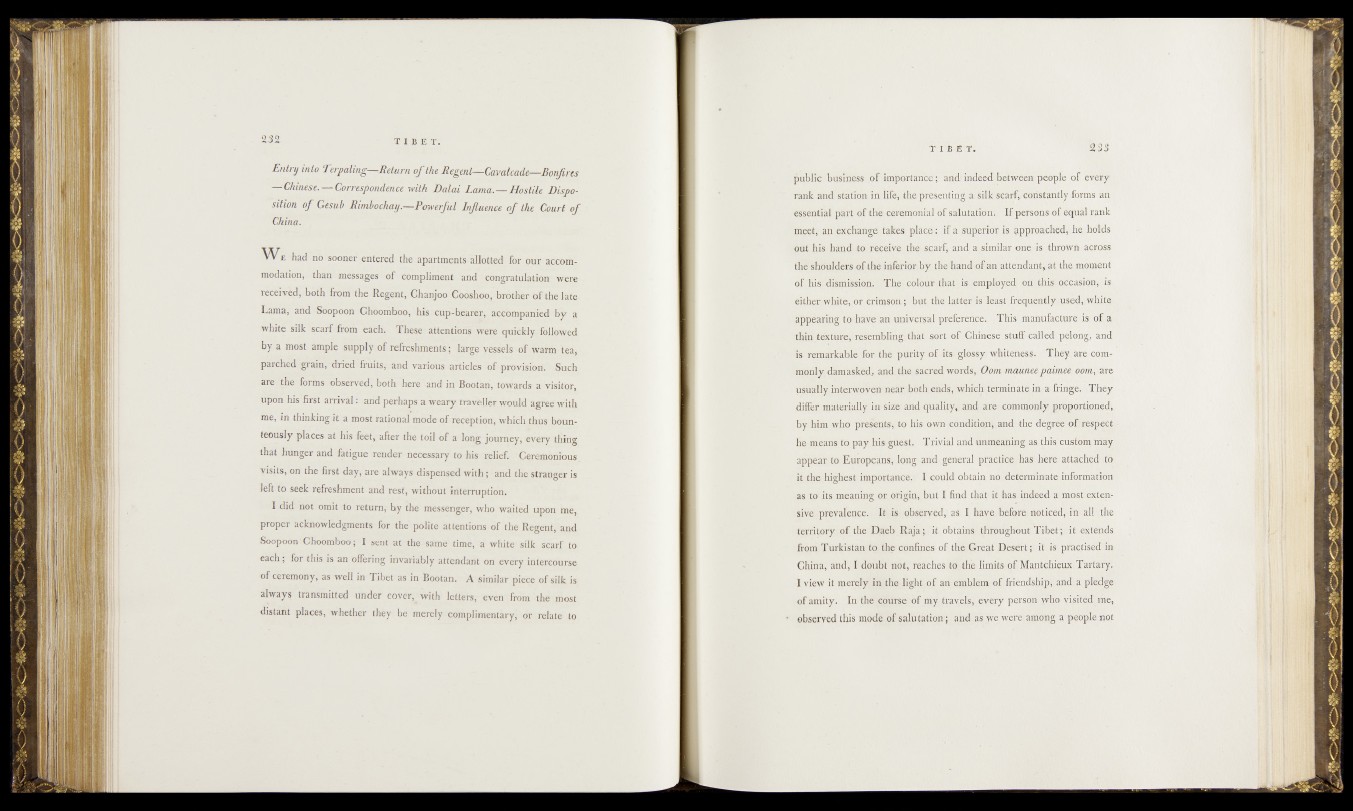
Entry into Terpaling—Return of the Regent— Cavalcade—Bonfires
—Chinese. — Correspondence with Dalai Lama.— Hostile Disposition
of Gesub Rimbochay.— Powerful Influence of the Court of
China.
had no sooner entered the apartments-allotted for our accommodation,
than messages of compliment and congratulation' were
received, both from the Regent, Chanjoo Codshoo, brother of the late-
Lama, and Soopoon Chdomboo, his cup-bearer, accompanied by a
white silk scarf from each. These attentions were quickly followed
by a most ample supply of refreshments; large vessels of warm tea*-
parched grain, dried fruits, and various articles of provision. Such
are the forms observed, both here and in Boo tan, towards a visitor,
upon his first arrival: arid perhaps a weary traveller would agree with
me, in thinking it a most rational mode of reception, which thus bounteously
places at his feet, after the toil of a long journey, every thing
that hunger and fatigue render necessary to his relief. Ceremonious
visits, on the first day, are always dispensed with; and -the stranger is
left to seek refreshment and rest, without interruption.
I did riot omit to return, by the messenger, who waited upon me,
proper acknowledgments for the polite attentions of the Regent, and
Soopoon Choomboo; I sent at the-same time, a white silk scarf to
each; for this is an offering invariably attendant on every intercourse
of ceremony, as well in Tibet as in Bootan. A similar piece of silk is
always transmitted under cover, with letters, even from the most
distant places, whether they be merely complimentary, or relate to
T i B E T.
pubifGi’ business of itripj^rtafice1; andfiridefdlfrelweerrpeople of every
rank and station iri[Iim);^eq$fecnliggenLsilk»sc1atfr,constdnd)riprins an
essential part the?c^rrioiifal’hf^sf^fafili'htr If pefsdnsm^qual rank
meet, an exchange,, takes place: if a superior, i\- {qjpip^cHed,dig'i holds
out hisk handjto receive the 1sgai^ri|idi,a|simi’laE one; iWCfiteyfHacioss
tlm shoulders ofithe inferior by
of Ins dismission The colour that is on'TthiMjq<!c-dsion,Us
either white, o^-crimson; ;but the 1 itter\is" least (hdqiiiOTit'IyiUsed,v«lute,,
appealing to "have an universah'prelerence. ‘This ,m ijicif.i/'Vu eH.is,?
thin .texture, resembling, that sort q£;Ghinese s tuf febd'H Ayspeldng*, and
is remarkable for the purity of its glossy wliitcfesisi; •‘They aie.cwnr-
monly damasked, and the, sacred words,, ObmimautieSpaiMee,.oom-',Ure
ugually interwoven'near both ends, which terminate ins,a Mri'gc.^ Tlic.y
differ, materially in size and quality,,-.and a^c^mrii^nj^'Bip©,ortioned',
by him who prcstnls, to his own-corlaitioni and Che dui,»cdjOl^gLsjiect
he means to pay his guest. Trivial and rinni^nin&^tti^Griston^may
appear to Europeans, lpng an.d-^gerfe’fjd practice has here. atlKi'cfifeflst'q
it the highest importance'.1 I could,obtain•u^deferm'ihptcoinf'iimation
as to its meaning or origin, but I find tha^ifetos. indeed
sive prevalence. It is observed, as I haste!before$iicttteed^in all the
territory of the Daeb Raja; it obtains, throughout Tibet; it.extends
from Turkistan to the confines of the Great Desdrt; it is- practised ’in
China, arid, I doubt notrfeaches,l^tfie'limits$ofi]^iE|iiie§ieux:.TartaEy:j
I view it merely in the| Iighri-o£ kri, erilhlem -of ‘friendship^fanil a pledge
of amity. In the course of my travels;.every per^®||ljp visited,me,
observed this mode of salutation; ancU'aStjwe were among -a pebpte,not